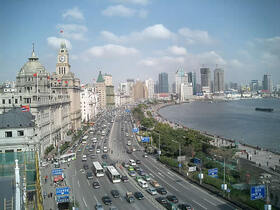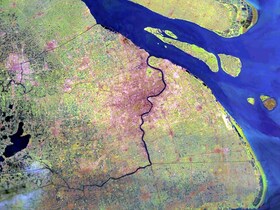The Chongming research studio is an initiative from the Rotterdam Academy of Architecture (RAVB) and the International Institute of urban management (IHS-Erasmus University) and will be organized in collaboration with the International New Town Institute Almere (INTI) and Tongji University Shanghai. The aim of this multi-disciplinary research studio is to get a better understanding of contemporary Chinese urbanization processes and more specific to develop different scenarios for the future transformation of the rural island Chongming (Shanghai), while being aware of the bigger questions of the (Chinese) urbanization pressure on this rural landscape, the transformation of production landscapes and the contemporary discussion on ecological urbanism.
CONTEXT:
Chongming is a large fluvial island situated in the Yangtze River north of Shanghai. The island has a predominately agricultural land-use and is even mentioned as the ‘granary’ of Shanghai. Recently the rapidly expanding metropolis of Shanghai and new infrastructural connections have brought a radical and undeniable pressure to the island and make Chongming one of the next potential targets of Shanghai’s expansion thrift. Against the backdrop of the Shanghai World Expo 2010 entitled “Better Cities Better Life”, a research-study to the future development of Chongming will be very actual. Previous studies done by international architectural firms SOM and ARUP gave Chongming international fame and presented the island as the location of the first sustainable eco-city in China: Dongtan.. Until today however these proposals have not been implemented and most of this attention has since been lost.
STRUCTURE OF THE SEMESTER:
The studio aims to work as a research-lab that explores different development strategies for the island. Participating students from the RAVB / IHS will be divided into 3 groups of each 10 students. Every group will develop a different hypothetical model for the future transformation of Chongming Island. For this research we distinguish between 3 different development models:
– Urban development model
– Agricultural development Model
– Ecological development model
Beside these collective design projects the students will work on individual research theses which will support the designs and give specific insight in the characteristics, backgrounds, qualities and problems of the three different development scenarios.
COLLABORATION:
The collaboration between the RAVB, IHS, INTI and Shanghai Tongji University will hopefully lead to an intensification and elaboration of the proposed research study. Due to the mutual exchange of knowledge and expertise in the fields of architecture, urbanism and urban management we expect to be able to present a broadly based research-study that provides new insights into the complex conditions of contemporary Chinese urbanism.



